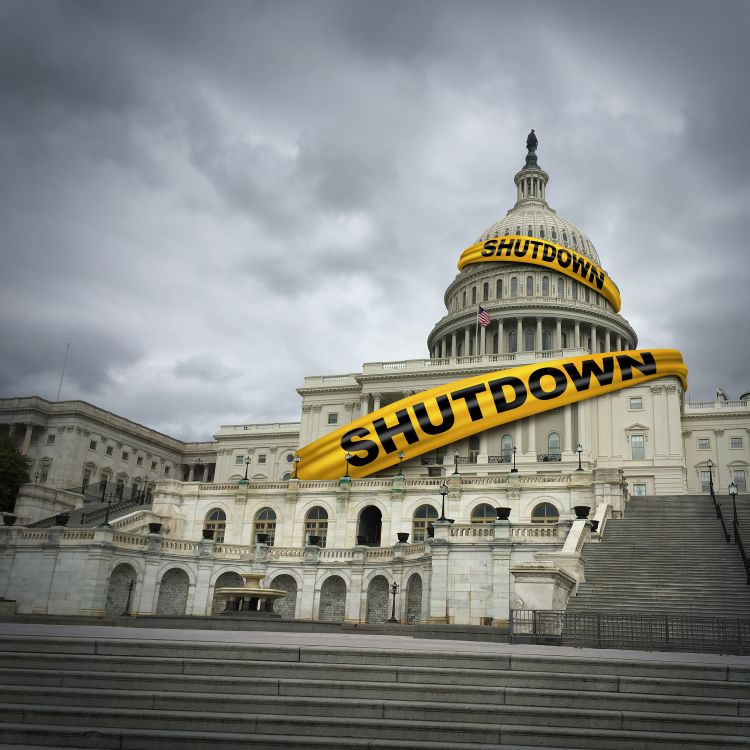
October 7, 2025

The federal government shut down on October 1, 2025, after lawmakers couldn’t agree on a plan to fund operations for the new fiscal year. It’s the first shutdown since 2018-2019 and comes at a busy time for both taxpayers and businesses. It’s just two weeks before the October 15 filing deadline for extended individual returns. Concurrently, many Atlanta businesses are undergoing year-end tax planning.
Hundreds of thousands of federal employees are now on furlough, and several agencies have either scaled back or stopped operations. The longer the shutdown goes on, the greater the effect it could have on tax filings, refunds, and other programs that depend on federal funding or oversight. To help clients, prospects, and others, Wilson Lewis has provided a summary of the key details below.
The government shutdown began when Congress missed the September 30 deadline to fund the new fiscal year. Both the House and Senate proposed short-term measures to keep the government open, but the plans differed in how they allocated spending and what programs they covered. When lawmakers couldn’t agree before the deadline, the government’s funding authority expired, which triggered a partial shutdown. Many agencies are required to suspend normal operations until new legislation is passed and signed into law.
About 750,000 federal employees have been furloughed, and many others are still on the job without pay because their work is considered essential. That includes national defense, air traffic control, and law enforcement. Most other federal programs, such as research, grants, and regulatory reviews, are temporarily on hold until funding resumes.
The IRS is one of the agencies drawing the most attention right now as filing deadlines approach and taxpayers wait for updates on returns and refunds.
The IRS expects to have enough funding to operate for about five business days from the start of the shutdown. After that, the agency plans to begin reducing operations if Congress hasn’t restored funding. Reports indicate that about 35,000 employees would be furloughed, while about 40,000 would stay on the job to handle tasks such as processing returns and payments.
The IRS is relying on limited funds from the Inflation Reduction Act to keep those core functions going for now. These funds cover basic taxpayer services, but they aren’t designed to sustain the agency for an extended period. If the shutdown continues beyond the first week, taxpayers could start to see slower processing times, delayed refunds, and reduced access to phone support.
The October 15 filing deadline for taxpayers who received extensions earlier this year is still in effect. The IRS has not announced any plans to postpone it.
The AICPA has asked the IRS to keep all employees on the job during the shutdown, stressing that a full staff is important to avoid backlogs and other stressors experienced during the last shutdown. They also warned that limited staffing could delay updates on the One Big Beautiful Bill Act (OBBBA), which includes tax changes that apply retroactively to 2025 and others that start in 2026. Guidance will be needed as taxpayers and businesses plan for upcoming filings.
For now, CPAs recommend filing electronically, keeping records, and watching for updates from the IRS. Businesses waiting on refunds or credits may want to plan for longer turnaround times.
The shutdown is already affecting both the economy and daily business operations. The White House estimates it’s costing about $15 billion per week in lost output. The longer the shutdown goes on, the greater the economic impact will be.
Many federal offices that process loans, permits, or compliance reviews are operating with limited staff. Those delays can hold up projects and cash flow. Most companies can adjust in the short term, but if the shutdown drags on, it could start to affect schedules, year-end reporting, and the ability to plan ahead.
Aside from the obvious financial challenges, federal reports on jobs, inflation, and overall economic growth are on hold, leaving business owners and investors without the data they normally rely on to make decisions. Without this data, it’s harder to budget, forecast, and plan for hiring or expansion, especially as many businesses are already navigating higher costs and tighter margins.
The key question is how long this will last. If a short-term funding bill passes soon, most operations will restart right away. If not, the effects will grow, especially for the IRS, taxpayers, and businesses waiting on payments or approvals.
Congress has two options. Lawmakers can pass a full-year budget that funds agencies through September 2026, or they can approve a continuing resolution (CR), which extends last year’s funding levels for a set period while negotiations continue. Until one of those passes both chambers and is signed by the President, most federal operations will be limited.
Contact Us
No one knows how long the government shutdown will last. As negotiations continue, taxpayers and business owners may face delays and uncertainty in the weeks ahead. The best approach right now is to stay alert, keep records up to date, and watch for official updates from the IRS and other agencies. If you have questions about the information outlined above or need assistance with another tax or accounting issue, Wilson Lewis can help. Fort additional information call 770-476-1004 or click here to contact us. We look forward to speaking with you soon.